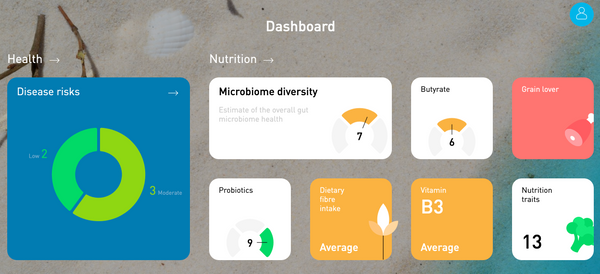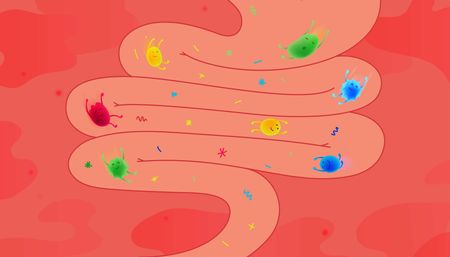When the gut microbiome is imbalanced, it can create problems for your digestion and general health. Experts call it dysbiosis, and here’s what you need to know about it.
Every week, led by Tania, our amazing customer service department answers your pressing questions about our tests. Unsurprisingly, diet, food, and the features of our gut microbiome test are particularly popular subjects.
More often than not, these topics are combined into a single question that includes many elements of response, and that can make it hard to answer in a short email. So we’ve decided to help Tania out and get down into the weeds on complex questions.
With the help of doctors and microbiome experts, we’ll explain important basics on gut dysbiosis (compared to the functions of a healthy gut microbiome) and what our results can tell you about it.
We also discuss parasites, candida, and small intestinal bacterial overgrowth (SIBO) in the context of microbiome testing.
What is dysbiosis?

Listen to your gut: it says it right there on the box
Dysbiosis is a medical term that describes alterations in the microbiome that can have a negative impact on health. It’s important to remember that the body has several microbiomes, not just one.
If there are too many of one microbe, not enough of others, or a lack of diversity in the types of bacteria that make up the microbiome, it can have an impact on your health. This is called dysbiosis.
Here, we’ll specifically talk about dysbiosis in the large intestine, also known as the colon. As you may already know, it’s generally just referred to as the gut microbiome or gut microbiota. We also use the words microbiota and microbiome interchangeably.
However, dysbiosis can also affect other parts of the human body, like the skin, the mouth, the vagina, and even the male appendage. These types of dysbiosis will not be discussed in this article.
Dysbiosis and the gut microbiome
A balanced gut microbiome is symbiotic: it lives in harmony with the human host and confers health benefits. This collection of microorganisms contains trillions of bacterial cells that do many things for the human.
Here are just a few functions performed by a health gut microbiota:
| Prevents inflammations | Trains the immune system |
| Produces vitamins and enzymes | Produces short-chain fatty acids, like butyrate |
| Helps maintain the gut lining | Maintains the correct pH for the colon |
| Fights off pathogens | Protects from chronic diseases |
| Helps control body weight | Influences mood and sleep |
Many digestive symptoms, like gas, bloating, cramps, diarrhoea, and constipation can be caused by disturbances in the gut microbiome. When this ecosystem is imbalanced, it can't perform essential jobs like protecting itself from opportunistic bacteria.
Opportunistic bacteria are microbes that cause problems when they become too abundant. They consume the food sources that should be directed to other species. They also produce gas and compounds that cause inflammation and irritate the gut lining.
Microbiome test results and dysbiosis
In order to achieve optimal function and fulfill all these important jobs for your health, the microbiome has a few requirements:
-
Diversity: there should be a wide variety of bacteria in the gut. This allows them to perform complementary activities, deter pathogens, and take over a specific job if something happens to one species. Low diversity is a sign of dysbiosis.
-
Balance: having balanced proportions of different microbes indicates that they are living in harmony. When there are too many of some, or not enough of others, it’s a sign that something isn’t quite right. Overgrowth and/or a lack of specific bacteria are linked to dysbiosis.
-
Dietary fiber: many types of dietary fiber have a prebiotic role for the gut microbiome. Prebiotics are simply dietary fibers (and some other complex carbohydrates) that nourish beneficial bacteria in the gut. If the diet doesn’t have enough different fibers or the microbiome doesn’t contain the right bacteria to break them down, this can be sign of dysbiosis.
-
Disease protection: there are patterns of dysbiosis associated with common diseases. The less features your gut microbiome has in common with each pattern, the better your protection from this illness. Sharing several microbiome traits with a pattern linked to illness may indicate dysbiosis.
-
Probiotics and beneficial bacteria: these bacteria perform essential roles for human health. They promote stability and deter pathogens. That is why a healthy microbiome is, in part, defined by their presence and abundance in the gut. Lack of beneficial and probiotic bacteria may indicate dysbiosis.
Why doesn’t my report show dysbiosis?

The microbiome results dashboard has all the important features
Our tests don’t contain a specific dysbiosis report, and there are a few reasons for this. Some are inherent to our regulatory environment, and others are due to the current state of research in this field.
External factors
Mainly, everybody’s gut microbiome is unique - this is a fact that researchers are wrangling with in the quest to master the science of this incredible ecosystem.
Part of what makes them unique are the external conditions. Here are some factors known to influence the composition of the gut microbiome:
| Diet | |
| A diet high in fat, refined sugar, and animal products | Not enough dietary fiber or diversity in diet |
| Exercise | |
| Lack of physical activity | Regular moderate-to-high intensity aerobic exercise |
| Lifestyle | |
| Chronic and acute stress | Smoking |
| Medical history | |
| Vaginal or C-section birth | Breastfeeding, antibiotic use at birth |
| Prescription drugs | Antibiotic treatment during lifetime |
| Obesity and chronic diseases | Gastrointestinal infections and surgery |
One reason why research can be difficult is that humans tend to tell themselves stories about how they live and what they eat. This is through no fault of our own, it’s just what we do. We all have a narrative, and we inadvertently choose to amplify some things and downplay others.
These stories we tell ourselves, our friends, and our doctors about our diet, exercise, alcohol consumption, happiness in relationships (and more) are tailored to fit into the narrative we’ve designed for our lives.
Our brains and consciousness have opened up many worlds of experience, but we can’t remember everything. Sometimes, we even forget what we had for breakfast, let alone the specific dates of the last time we took a non-steroidal anti-inflammatory painkiller.
In addition to that, most of us have not been trained to identify, record, and assess factors in our lifestyles that can influence our health or gut microbiome. We have jobs, families, and lives. That doesn’t leave much time to acquire a PhD in Health Sciences and Human Biology.
This makes it very difficult to assess external factors accurately, yet these things can have a palpable impact on the composition of our gut bacteria. There are limitations set by science and by our own ability to identify and record important information.
Rules and regulations
Furthermore, it takes a long time for new technology to go mainstream, and so, we are constrained by regulatory features of our approval. The Atlas Biomed Tests are certified for sale directly to the public.
We use test kits, a laboratory, and technology that meets stringent international standards. However, microbiome testing is not currently recognised as a diagnostic tool for use (and reimbursed) by state healthcare systems.
It's important to remember that diagnostic testing methods are generally not made available to the public, the same way you can't get many pharmaceutical drugs without a prescription. They can only be obtained from an approved medical healthcare provider who follows a strict protocol.
Diagnostic procedure and drugs are regulated because they need someone with a specific knowledge and skill set to analyse them correctly. This requires many years of education, without which there is a high risk of misinterpretation of results, or misuse of a substance.
For these reasons, we do not provide a “dysbiosis” report. Nevertheless, our tests are also used by medical experts and clinics specialised in nutrition and lifestyle medicine.
If you are experiencing digestive symptoms that have not been identified by common diagnostic procedures, like a colonoscopy, a microbiome test combined with the guidance from a medical expert in this field may help.
Parasites, viruses and candida
There are other factors that can influence abdominal discomfort. Parasites and fungi, especially yeast overgrowth (Candida), are common questions for our customer care department.
If you suspect a problem related to yeasts or parasites (often caused by contaminated water and food or exposure to infected livestock), consult a doctor for diagnostic testing.
SIBO: small intestinal bacterial overgrowth
SIBO is a buzzword on the internet nowadays. It refers to a condition in which bacteria have become overabundant in the small intestine. This is a problem because they’re supposed to live in the large intestine (a.k.a. the colon).
It is a poorly understood condition that is difficult to identify using current diagnostic methods. SIBO is usually considered as a possible issue when other causes have been ruled out.
However, SIBO affects a different part of the intestines. It is found in the small intestine, which is responsible for nutrient absorption. The gut microbiome is located in the large intestine, the last stop for digested food before the exit.
Therefore, our Microbiome Test is not capable of identifying SIBO. It is specifically focused on the features of the gut microbiome in the colon, and does not provide any information on this condition.
If you think SIBO might be involved in your digestive discomfort, please consult a doctor who can assess your case and prescribe diagnostic procedures if suitable.


















